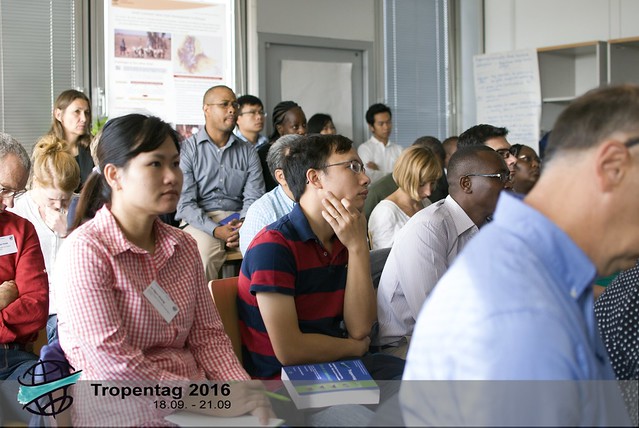"Are you lecturing them?" - Self-critical reflexion on 5 year CGIAR experiment about livestock value chains
It’s nine o’clock on the first day of the Tropentag 2016, the room quickly filled up with people eager to hear what’s new about the sustainable integration of livestock smallholders in value chains through multi-stakeholder platforms. Following the motto „More meat, milk and fish for and by the poor “, during this interactive workshop CGIAR presented the results of their five-year research in developing countries, encouraging to ask critical and challenging questions in order to improve their model.

Background of the experiment is the increasing demand of livestock in developing countries, where smallholders currently provide about 70% of livestock produce. While the production of livestock thus offers great business opportunities, smallholders are often not part of this transition. CGIAR, in this “very expensive experiment”, tried to develop models, strategies and technologies to empower smallholders and women, ensure food security and improve health and environmental issues, amongst others.
Tom Randolph, Director of the CGIAR Research Program on Livestock and Fish, summed up the reformation of CGIAR to a more impact-oriented research institution with 15 developing centres around the world. So CGIAR chose a holistic approach, “working directly to design and support intervention at scale in partnership with developing countries”. The experiment should focus on the improvement of food security through sustainable intensification and more commercial and professional production of livestock produce.
For five years, interdisciplinary teams worked on an improved AR4D model providing urgency, accountability and sharper prioritization. “Is this really what CGIAR is doing?” the audience asked Randolph, smiling. “And is it right?”.
 For the next two hours, in so-called “bus stops” (travelling around the world has never been so fast!), the audience, split up into five groups, could listen to the presentations about daily produce and animal health issues in Tanzania, sheep and goat meat value chains in Ethiopia, gender-integrated (value chain) assessment tools, means to improve fish health in Egypt, smallholder pig value chains in Uganda and environment and climate change issues in Nicaragua and Tanzania, just to mention a few.
For the next two hours, in so-called “bus stops” (travelling around the world has never been so fast!), the audience, split up into five groups, could listen to the presentations about daily produce and animal health issues in Tanzania, sheep and goat meat value chains in Ethiopia, gender-integrated (value chain) assessment tools, means to improve fish health in Egypt, smallholder pig value chains in Uganda and environment and climate change issues in Nicaragua and Tanzania, just to mention a few.
Also as a non-expert of livestock issues in developing countries, one could follow and take part in the fruitful discussions about the sustainability of the programs, ask about the economic feasibility for the farmer, about statistics, reactions of the farmers, experiences with realising certain approaches of building platforms, and how to approach farmers about the new programmes in general. “Are you lecturing them?” asked a woman, half-laughing, half-serious.
The speakers have been self-critical enough, naming challenges (“When you’re dealing with thousands of fish farmers, that’s not easy”) and open questions in their research and need for improvement, e.g. the need for pricing mechanisms, trader empowerment and breeding centres (Uganda). Due to lack of time, the issue of the sustainability of implemented changes and the impact on the real life of the smallholders were recurring questions in the discussion. The whole workshop wrapped up in a circle of four chairs where always four people could contribute to the common reflexion about the whole research approach, problems and outlook.





Comments
Post new comment